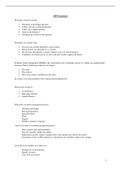Samenvatting
Summary of the course Advanced Research Methods
- Instelling
- Erasmus Universiteit Rotterdam (EUR)
Summary of the most important elements of the course Advanced Research Methods of the bachelor Business Administration / Bedrijfskunde at the RSM, Erasmus University.
[Meer zien]




